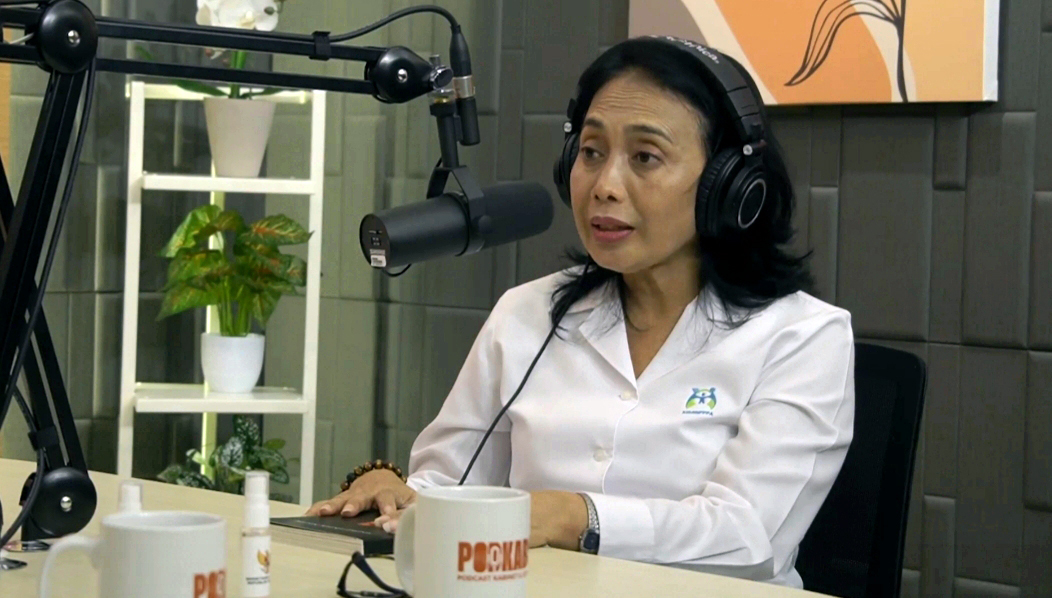Minister of Women’s Empowerment Shares Stories of Smashing Patriarchy

Minister of Women’s Empowerment and Child Protection Bintang Puspayoga becomes a guest for Podkabs: Episode 3. (Photo by: PR of Cabinet Secretariat/Agung)
Gender disparity is correlated to the patriarchal social construction in Indonesia, which refers to prioritize men over women in society or certain social groups, according to Minister of Women’s Empowerment and Child Protection Bintang Puspayoga.
For the record, women’s human development index (HDI) in 2021 remained below men’s. Women’s HDI was 69.59, while men’s HDI was 76.25, so Indonesia’s gender development index (GDI) was 91.27, which indicates that there is a gap between women and men.
“When looking at data and index, be it HDI that measures aspects of education, economy, health, the disparity between men and women’s HDIs is extraordinarily huge. We see it from the GDI,” Bintang said when she attended Podkabs (Cabinet Secretariat’s and Cabinet’s Podcast) as a guest.
Bintang stated that scraping the rooted patriarchal culture is not easy and it requires everyone’s support, including public figures and religious figures.
“It needs the support of public figures, religious figures. It will be important to place women and men in an equal position, no more marginalization, no more stigmatization, no more female stereotypes. Thus, women will be given a chance to access, then to receive the benefits of development, it must be equal,” she remarked.
Bintang also underscored the importance of regional governments’ support, adding that the power in women’s empowerment and fulfillment of children’s rights are closely related to regional heads’ policy programs.
“If Minister of Women’s Empowerment and Child Protection comes to a region, the minister asks for help to the governor, regents, and mayors. What is the policy? What is the program for women and children in their respective areas?” she said.
During the Podkabs talk, Bintang shared her story about the measures carried out to solve the kidnapping case perceived as forced marriage in the island of Sumba, East Nusa Tenggara in 2020.
According to Bintang, forced marriage framed as a culture should no longer be practiced as it contains violence and lowers the dignity of women.
In 2020, Bintang pointed out, Ministry of Women’s Empowerment and Child Protection involved all components of the public and regional governments and initiated the signing of agreement on women and child protection enhancement among regional heads, supported by the local police, religious figures, and social institutions.
“In protecting women, we must have a shared commitment, especially with regional governments, with law enforcers, and we must join hands, synergize, collaborate in protecting women and children, certainly,” she said.
Furthermore, Bintang spoke about the efforts done to improve women’s empowerment when she was the Head of the Family Empowerment and Welfare Mobilization Team in Bali in 2000. During her service period, she initiated Women’s Gong Kebyar Festival, which allowed women an opportunity to play instruments of gamelan, a traditional instrumental ensemble that used to be dominated by men.
“We made a team, then approached customary leaders, religious figures. I educated them to make the team. Every night, I watched them. I came to one neighborhood to another so that they want to be a member of the Gong Kebyar Festival,” she said.
Ending the dialogue, Bintang called for all Indonesian women to empower Indonesia and move towards an advanced Indonesia.
“All women across Indonesia, let us all begin to support each other, inspire each other, motivate each other to become empowered women, to realize an advanced Indonesia,” she remarked.
For the record, Podkabs or Cabinet Secretariat’s official podcast contains many talks and discussions about a wide array of topics, including Government policies and hot issues circulating among the people. Discussions with various guests are packaged in a light and relaxed delivery.
Subscribe to the YouTube and Spotify channels of Cabinet Secretariat to discover every new episode of Podkabs. (FID/MAY/RF/JAW/AIT/UN) (DH/LW)








